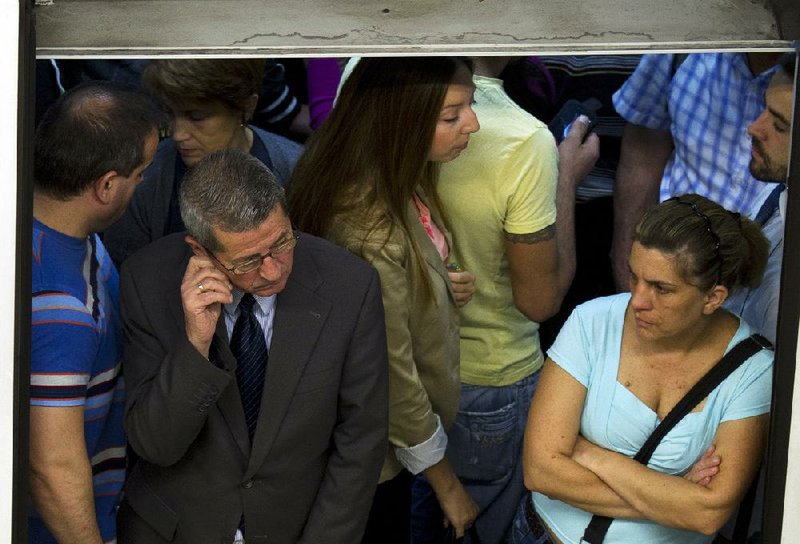LITTLE ROCK — Greek Prime Minister Antonis Samaras struggled Friday to clinch agreement with his coalition partners on a $14.9 billion budget-cut package that’s key to receiving international aid funds.
Samaras on Thursday was handed the third refusal in less than two weeks from Democratic Left leader Fotis Kouvelis and Pasok leader Evangelos Venizelos, the junior partners in the coalition who met to discuss proposed cuts to wages, pensions and benefits.
Finance Minister Yannis Stournaras and the “troika” of inspectors from the European Commission, the European Central Bank and the International Monetary Fund have been locked in talks for two weeks on carving out savings.
“The troika must stop attacking Greek society,” said Kouvelis after conferring with Venizelos. “The troika must understand there are limits.”
The troika, representing the international lenders in Greece’s bailout package, have already said some of the reductions don’t go far enough, forcing all parties back to the negotiating table repeatedly over the past two weeks.
The standoff sent Samaras into meetings in Rome on Friday with his Italian, Spanish and Irish counterparts without solid domestic political backing on the package he has said is necessary to restore Greece’s credibility and keep the country in the euro. Euro-area finance ministers are expected to rule on the budget measures on Oct. 8.
A Finance Ministry official said $12.3 billion of the package had been agreed upon, with $8.4 billion of that related to cuts in pensions, wages and benefits. An increase in the retirement age from 65 to 67 will bring in $1.3 billion.
Some progress was made in five hours of talks Thursday night, said the official, who asked not to be identified by name.
He said an agreement may be reached soon, as new proposals to make up for the shortfall were brought to the table.
The government is seeking an agreement with the troika on most of the spending cuts by Sunday. The mission is due to leave Athens soon if the agreement is not secured and will not return until early October, said the official. A lower-level technical team will remain in Athens.
Kouvelis said there was no final agreement on any measures. A new meeting of the coalition party leaders will be held next week, he said.
Samaras is facing opposition from Venizelos and Kouvelis on across-the-board cuts to pensions and wages, demands to fire civil servants and changes to labor laws as popular opposition rises in the fifth year of recession with almost a quarter of the workforce unemployed. All public transit workers walked off the job Thursday, affecting subway, bus and train services.
Agreement on the package from Greek political leaders and the troika is imperative to allow the release of a $40 billion payment that is designed primarily to recapitalize the nation’s banks in a bid to boost liquidity in a cashstarved economy.
Venizelos told reporters after the meeting that the amount of savings coming from lower pensions, wages and benefits proposed by the troika was “excessive” and needed to be reduced.
A senior Italian government official said Friday that Italy and Spain won’t request bailouts unless a new surge in bond yields leaves them shut out of markets as no government will voluntarily accept conditions imposed for the aid.
“There won’t be any nation that voluntarily, with a pre-emptive move, even if rationally justified, would go to an international body and say, ‘I give up my national sovereignty,’” Undersecretary of Finance Gianfranco Polillo said in Rome late Thursday. “I rule it out for Italy and for any other country.”
Italian and Spanish 10-year bond yields have dropped more than 1 percentage point since European Central Bank President Mario Draghi first signaled on Aug. 2 that the bank would buy debt of distressed euro-region nations in tandem with the European Union’s bailout funds.
While Italian Prime Minister Mario Monti championed the EU bond-buying plan, Draghi’s insistence on imposing conditions on any aid has left Monti and Spanish Prime Minister Mariano Rajoy reluctant to make a request.
The program “will be activated only when the single countries have the water up to their necks,” Polillo said.
Information for this article was contributed by Marcus Bensasson, Natalie Weeks, Maria Petrakis, Eleni Chrepa, Chiara Vasarri and Lorenzo Totaro of Bloomberg News.
Business, Pages 31 on 09/22/2012

